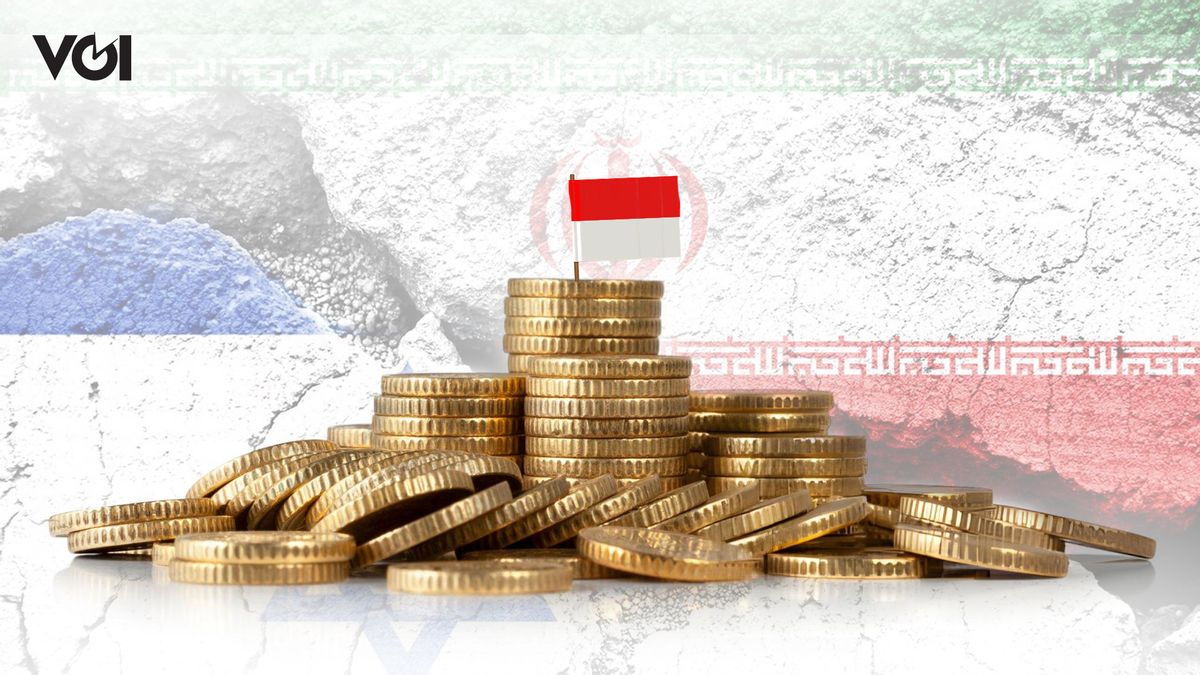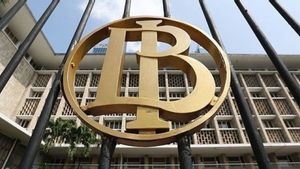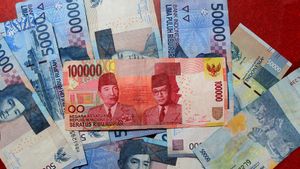JAKARTA The conflict in the Middle East region is getting hotter after Iran and Israel responded to attacks. This is what makes countries around the world, including Indonesia, have to prepare for global impacts amid the war of Russia and Ukraine.
Like the wars of Russia and Ukraine, the conflict between Iran and Israel is said to have an impact, especially on the Indonesian economy. The lecturer at the Faculty of Economics and Business at the University of Indonesia, Fithra Faisal Hastiadi, revealed that if the impact of the Russia-Ukraine war on the Indonesian economy was more aimed at the food sector, then the Iran-Israeli war would certainly be more about the stability of world oil prices.
"The impact of the uncertainty situation in the midst of conflict that we can feel directly is world oil prices which certainly affect fuel prices in the country," he said, Sunday, April 21, 2024.
He hopes that the Iran-Israeli conflict will not last long. According to him, this could happen because currently the parties in the vortex of the conflict understand that they are trapped in a 'Mexican standoff' situation.
Fithra explained that the term is usually used to refer to situations when parties involved in one conflict know their positions are equally strong and threatened. In conditions like this, there is no strategy that can make either party win.
They actually knew each other that behind Iran there were Russia and China. Iran also knows that behind Israel there are the United States and NATO," he added.
However, if the conflict between the two countries continues, it is almost certain that world oil prices will rise above 100 US dollars per barrel. Because, apart from being located in the Middle East, Iran is also included in the list of the top ten largest oil-producing countries in the world.
SEE ALSO:
The price increase was not due to reduced supply but disruption of trade routes. In southern Iran, there is the Strait of Hormuz which is the world's most important oil trade route. About a fifth of global oil production pacing the Strait of Hormuz every day," explained Fithra.
He stated, if the worst scenario occurs, Indonesia as an oil importer will be affected. The price of fuel will skyrocket, which will then be followed by an increase in commodity prices. This will make the burden of fuel subsidies in the State Revenue and Expenditure Budget (APBN) even greater if the government intends to maintain fuel prices at the current level.
Fithra explained, based on its calculations, the government must increase the budget for fuel subsidies of up to IDR 50 trillion-IDR 110 trillion. With this projection, government spending will be greater than tax revenue, or known as fiscal deficits.
"If it is already IDR 50 trillion-IDR 100 trillion, it means that the fiscal burden or fiscal deficit previously in the 2024 State Budget is between 2.3%-2.4%, the fiscal deficit could be 2.8%-2.9%," he explained.
He reminded that if this condition occurs, it will make investors run away because they are not sure that Indonesia can suppress the fiscal deficit by 2025. As a result, the value of the rupiah will decrease, even though the rupiah exchange rate against the United States dollar has reached Rp. 16,000.
Furthermore, Fithra revealed that fuel, electricity, and gas are important commodities in the production process carried out by producers. If the commodity tariff increases, the cost of production can also increase.
Usually, producers can charge the increase to the public by increasing the price of the goods they produce. When the price of goods in general increases continuously, inflation is estimated to increase and reach five percent, or increase from 2.61 percent in 2023.
He said, to reduce inflation, the government can carry out two intervention options. First, overcoming inflation in other sectors in order to reduce the impact of inflation in the energy sector for the community. An example is the strategy implemented by President Joko Widodo in August 2022.
At that time, many people were worried that inflation could reach ten percent because fuel prices had risen. Jokowi then asked the public to plant chilies, commodities that contributed to high inflation six months earlier. If the supply of chili is sufficient, the price will fall on the market.
"We will see the impact in October, even chilies have deflation, even though in September the price of fuel rose. As a result, our inflation at that time was below six percent," he said.
The second intervention, said Fithra, is to reduce the impact of inflation from abroad, namely the increase in world oil prices which ultimately affect the prices of other imported commodities. The trick is that the government must be able to identify producers who have high import components and have a large economic impact.
After that, the government can help manufacturers who have a big economic impact by providing subsidies when they want to import materials. That can be given subsidies so that the price is not transmitted to the consumer level and the price goes up, but is absorbed by the government through the subsidy route," he said.
Chairman of the DPR RI Budget Agency (Banggar), Said Abdullah asked the government to take a number of strategic steps to anticipate the impact of the heated conflict between Iran and Israel. As a first step, the government must make diplomatic efforts, through international institutions, both at the United Nations and the OIC to encourage a ceasefire between the two countries.
In addition, the government must secure supplies of petroleum for domestic needs. This is because Indonesia depends on imports of crude oil and oil yields an average of 3.5 million tons per month.
"If the war continues, the oil supply route through the Strait of Hormuz will be disrupted. The impact of the increase in world oil prices will be a big burden for our state budget," he said.
The politician from the PDI-P faction also asked the government to prepare the APBN in the face of external pressure due to rising oil prices and US dollar depreciation of the rupiah. This is because every rupiah that weakens by Rp500 and oil prices increase by US$10 per barrel, the subsidy or compensation budget has the potential to increase by Rp100 trillion. Meanwhile, the 2024 State Budget only charges the rupiah at the level of Rp15,000 per US dollar and the world oil price of 82 US dollars per barrel.
"The thing that is no less important is that the government must ensure the ability to pay State Securities (SBN) and foreign debt denominated by the US dollar, given the trend of rupiah depreciation against the US dollar from the average limit set in the 2024 State Budget," said Said.
So what about the government's readiness? Deputy Minister of Foreign Affairs, Pahala Mansury said that the current government has anticipated the worst scenario related to the impact of the Iran-Israeli conflict on Indonesia's trade activities with regional countries. This is because the conflict includes the global trade route zone in the Strait of Hormuz.
Despite having designed the worst scenario, the Indonesian government has tried to prevent the escalation of conflict from getting higher and wider, as stated by President Joko Widodo and Foreign Minister Retno Marsudi. You do this by using a diplomatic strategy.
"That we will try to ensure that our domestic parties and diplomacy outside can reduce escalation or avoid escalation and even try to make deescalation of these tensions," he explained.
Pahala explained, to anticipate the adverse impact of the conflict, the government refers to three indicators, namely the movement of energy prices and food prices, the increase in premium risk and its effect on capital outflows, as well as export and import activities.
However, he has not been able to reveal what anticipatory steps will be taken if the three indicators worsen. "Yes, that's what we need to see later, will the influence on the global supply chain really be like? This means that this has an impact on security rather than supply chain for transporting goods and so on," added Pahala.
The Coordinating Minister for the Economy, Airlangga Hartarto, emphasized that the government has prepared anticipatory steps to heat up the Iran-Israeli conflict. According to him, the government remains committed to maintaining market participants' confidence in national economic capabilities, maintaining the stability of the rupiah exchange rate by intervening in the foreign exchange market, strengthening policy synergies with KSSK and maintaining the level of public and government consumption.
"Basically, the Indonesian economy is relatively strong. The government will continue to pay close attention to existing global and regional developments and will take strong steps and focus on maintaining financial system stability," he said.
He explained that economic growth was still maintained above five percent with inflation in the range of 2.5 percent, the trade balance still experienced a surplus and foreign exchange reserves in March 2024 remained high, at 140.4 billion US dollars.
Meanwhile, through his Instagram account, Minister of Finance Sri Mulyani said that the current global situation would definitely have an impact on Indonesia. Regarding the weakening of the rupiah, for example, in terms of exports, it will have a positive impact on state revenues. However, on the import side, the conversion of dollars to rupiah will be higher and could have an impact on inflation.
He ensured that economic stability would continue to be maintained, both in terms of monetary and fiscal. The Ministry of Finance also continues to coordinate with Bank Indonesia to adapt to the existing pressures. From a fiscal perspective, we ensure that the APBN plays an effective and credible shock absorber," he added.
Sri Mulyani remains optimistic that Indonesia will achieve economic growth above 5 percent this year, reflecting on the economic resilience in the face of the last pandemic. "In the midst of the current high global interest rate and inflation conditions, I am sure that the Indonesian economy will be maintained according to the target, supported by a strong export side and a surplus trade balance," he said.
The English, Chinese, Japanese, Arabic, and French versions are automatically generated by the AI. So there may still be inaccuracies in translating, please always see Indonesian as our main language. (system supported by DigitalSiber.id)















